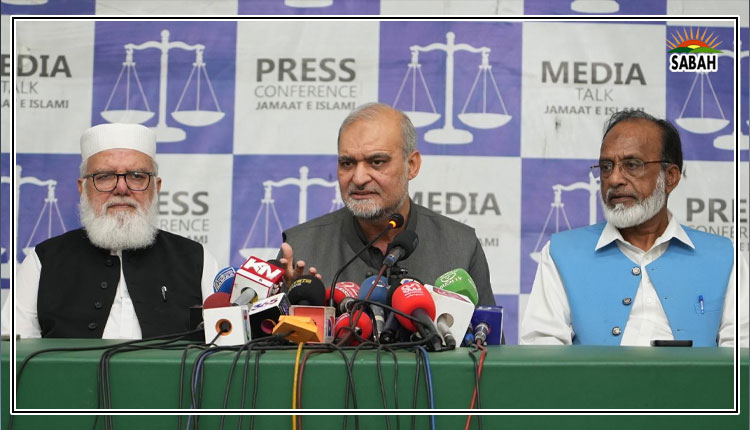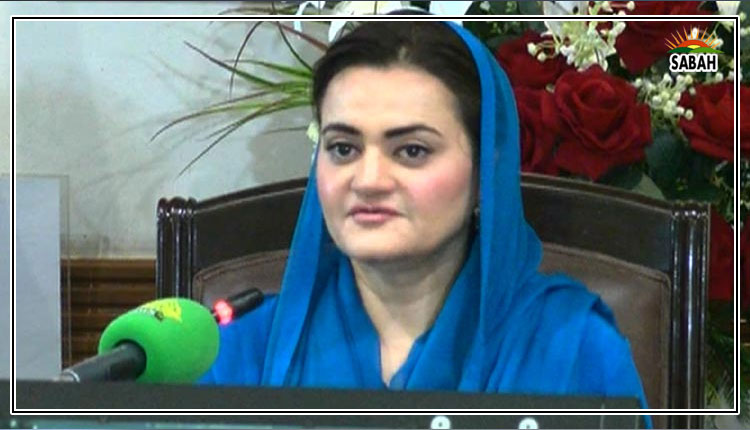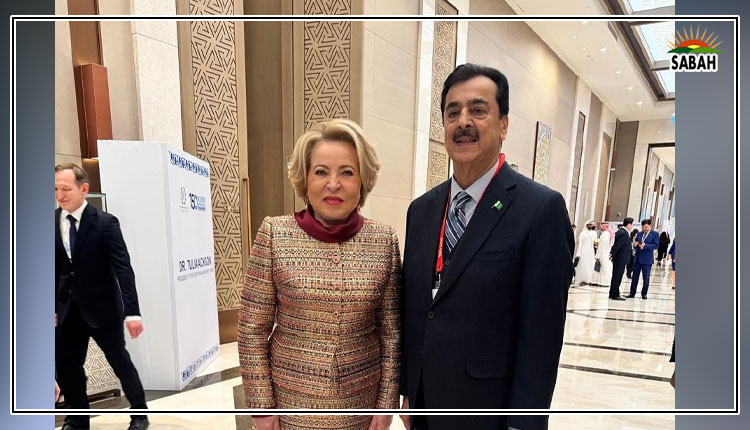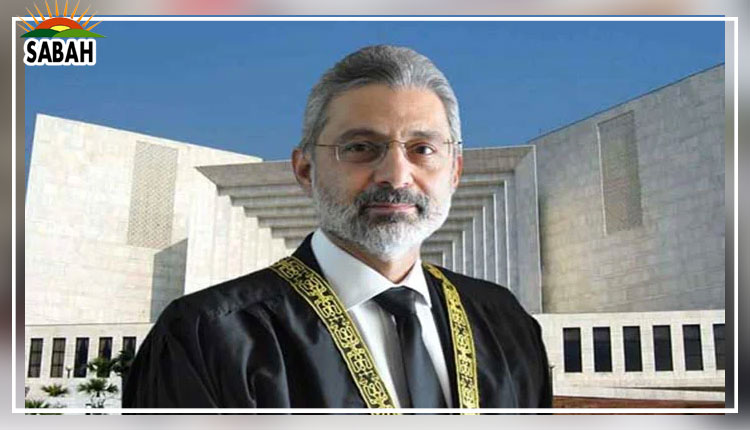No one, including a Judge of the highest court in the land, can be denied his right to be dealt with in accordance with law: SC
ISLAMABAD, Jan 29 (SABAH): The Supreme Court of Pakistan on Saturday issued a detailed ruling in a case pertaining to review petitions filed by Justice Qazi Faez Isa in the apex court against the verdict on presidential reference against him. The court had issued the short order of the case on 26/04/2021 and issued the detailed judgment on Saturday.
The preface of the judgment says that this judgment must announce loud and clear that no one, including a Judge of the highest court in the land, is above the law. At the same time, no one, including a Judge of the highest court in the land, can be denied his right to be dealt with in accordance with law. Every citizen of Pakistan, notwithstanding his status or position, is entitled to due process of law in any action detrimental to his life, liberty, body, reputation or property under Article 4 of the Constitution and safeguarding of his fundamental rights guaranteed under Articles 9 to 28 of the Constitution. It matters little if the citizen happens to hold a high public office, he is equally subject to and entitled to the protection of law.
While judicial accountability is the cornerstone of judicial independence, it does not mean that accountability of a judge is bereft of due process of law and fair trial guaranteed under the Constitution. An open court-house is no less than a glass house, yet the judges boldly and courageously uphold the law even against the mightiest in the land, without fear and favour, in full public gaze. In doing so, they step on many a toes and rattle many a skeleton. This may at times, invite efforts to discredit them by creating doubts about their personal integrity. Since judges have no public platform to clarify, respond or defend themselves, such efforts go beyond the person of the judge and undermine public trust and public confidence in the judicial institution. Constitutional safeguard of due process to enjoy the protection of law and to be treated in accordance with law, therefore, assumes even greater significance in the case where integrity of a judge is in question.
The 45-page judgment was authored by Justice Maqbool Baqir, Justice Mazhar Alam Khan Miankhel, Justice Syed Mansoor Ali Shah and Justice Aminuddin Khan and an additional note was penned by Justice Yahya Khan Afridi.
In a comment on the SC ruling that asked the tax commissioner to probe Sarina Isa’s assets, the judges remarked that the children and wife of Justice Isa were private citizens and the court acted beyond its jurisdiction by issuing such an order.
“The tax matter of the petitioner, Mrs. Isa, could not have been referred to the Council as the role and jurisdiction of the Council is limited to the matters relating to the conduct and capability of the superior Court Judges.”
“The impugned directions also create an anomalous situation… If in the event the Council, on the basis of the report submitted by the Chairman FBR…recommends removal of Justice Isa, but subsequently Mrs Isa, succeeds in her challenge to the order of the Tax Commissioner, and the said order is found not sustainable, the time for the retrieval may have passed as by then Justice Isa may have reached the age of superannuation… In a reverse scenario where the Council may not agree with the findings of the Tax Commissioner, but such findings are upheld by the forums, including this Court, before which the Tax Commissioner’s findings are amenable to correction, an anomalous and embarrassing situation may occur.”
The ruling said Justice Isa couldn’t be held responsible for the deeds of his spouse or children. “Needless to remind the salutary principle of law that everybody is responsible for his own deeds or misdeeds, acts and omissions, and nobody incurs any liability on account of any wrong committed by any other person.”
It further said that suo motu powers used to dictate the forum infringed the independence of the Supreme Judicial Council.
“…only the President of Pakistan…can direct the Council to inquire into the matter of alleged misconduct or incapacity of Judges of the constitutional courts, and the proceedings before the Council cannot be called in question in any court including this Court as provided in Article 211 of the Constitution except when the Council acts with mala fide (in fact or in law), without jurisdiction or coram non judice.”
The judgement added that there was no complaint against the council so there “was no occasion for this Court to direct the Chairman, Council to place the report of the Chairman, FBR regarding decision of the Tax Commissioner in the tax matter of Mrs. Isa and ask the Council to even conduct “proceedings” to decide whether or not it will inquire into the matter of alleged misconduct against Justice Isa in exercise of its suo motu powers”.
“Therefore, asking the Council, by the impugned directions, to conduct “proceedings” to decide whether or not it will inquire into the matter of alleged misconduct by Justice Isa in exercise of its suo motu powers is also tantamount to interference into the independent functioning of the Council and, thus, against the spirit of the provisions of Articles 209 and 211 of the Constitution,” the judgement stated.
It further said the impugned directions “authorized the Chairman, FBR to do that which he cannot do under the Constitution and the law”.
“He being an officer subordinate to the Federal Government cannot make any complaint against a constitutional court Judge directly to the Council; only the Federal Government can do so and that too by the constitutional process of acting through the President,” it added.
According to the judgment, the impugned directions “are found to have been made by this Court without adhering to the principle of natural justice, fair trial and due process…”.
Though the directives made by the Supreme Court were in good faith, the court “on its own, without putting to the parties on notice, without informing them what the Court was contemplating to do and without inviting and hearing their arguments on the matters dealt with therein, the above-noted legal and constitutional aspects of the impugned directions with their ramifications were not present in the mind of the Court while making the impugned directions”.
“If the Court had heard the arguments on the matters dealt with in the impugned directions and the legal position relating thereto had been debated and appropriately placed before it, the Court would not have made the said directions as the Court never intends to act contrary to law,” the judges wrote.
It further said, “We believe that the rule of law and the independence of judiciary are conceptually interwoven: without an independent judiciary, expecting the rule of law is a sheer farce.”
Justice Yahya Afridi in his note said the court didn’t have jurisdiction to issue the directives to the SJC to consider “initiating, or otherwise, an inquiry against the Petitioner Judge based on the “information” received from the tax officials of the FBR”.
“Before concluding, I think it is proper to make clear that the present order, by no means, seeks to curtail the lawful authority of the President, the Council and the tax officials to proceed against any Judge of the Superior Judiciary, including the Petitioner Judge, in accordance with law as mandated by Article 4 of the Constitution. We cannot champion the rule of law if we breed complacency in judicial accountability, a feature that seeks to uphold and bolster the rule of law. Thus, it is important to ensure that there are no artificial impediments to CRP No. 296 of 2020, etc 43 ensuring accountability of judges, provided accountability is pursued in accordance with law. This exposition of authority, in particular, of the tax officials, however, should in no way detract them from their statutory duty to remain steadfast in ensuring the confidentiality of the information of a tax filer as mandated under section 216 of the Ordinance which, as noted in the judgment under review, was blatantly breached in the case of Mrs. Sarina Faez Isa: the tax officials on the unlawful directions issued by the Chairman ARU, Barrister Shahzad Akbar with the concurrence of the Federal Law Minister, Dr. Farogh Naseem, breached the statutory confidentiality of Mrs Sarina Faez Isa’s tax returns. I feel constrained to observe that allowing the said delinquents to continue in such important positions of authority by the worthy Prime Minister, and that too after this Court has unanimously declared their actions to be in violation of the Constitution and law, particularly the provisions of section 216 of the Ordinance entailing penal consequences, belies the most elementary principles of “good governance”, and expose the worthy Prime Minister’s complicity in the commission of the said violations” Justice Yahya Afridi wrote.
It is worth mentioning here that 10-memebr larger bench of the Supreme Court of Pakistan headed by Justice Umar Ata Bandial and comprising Justice Maqbool Baqar, Justice Manzoor Ahmad Malik, Justice Mazhar Alam Khan Miankhel, Justice Sajjad Ali Shah, Justice Syed Mansoor Ali Shah, Justice Munib Akhtar, Justice Yahya Afridi, Justice Qazi Muhammad Amin Ahmed and Justice Amin-ud-Din Khan had heared the appeals of Justice Qazi Faez Isa and his wife Sarina Isa. The majority judgment has been singed by six judges. Justice Manzoor Ahmed Malik who was retired after the issuance of the short order on the review petitions has also singed the detailed order and has agreed with the judgment authored by four judges of the bench.












